Ethics and Financial Service
VerifiedAdded on 2023/06/09
|9
|2833
|296
AI Summary
This paper discusses the Royal Commission in Australia, corporate governance, conflict of interest, corporate culture, reward/punishment system, and global awareness. It also provides recommendations for improvement in the banking and finance sector.
Contribute Materials
Your contribution can guide someone’s learning journey. Share your
documents today.
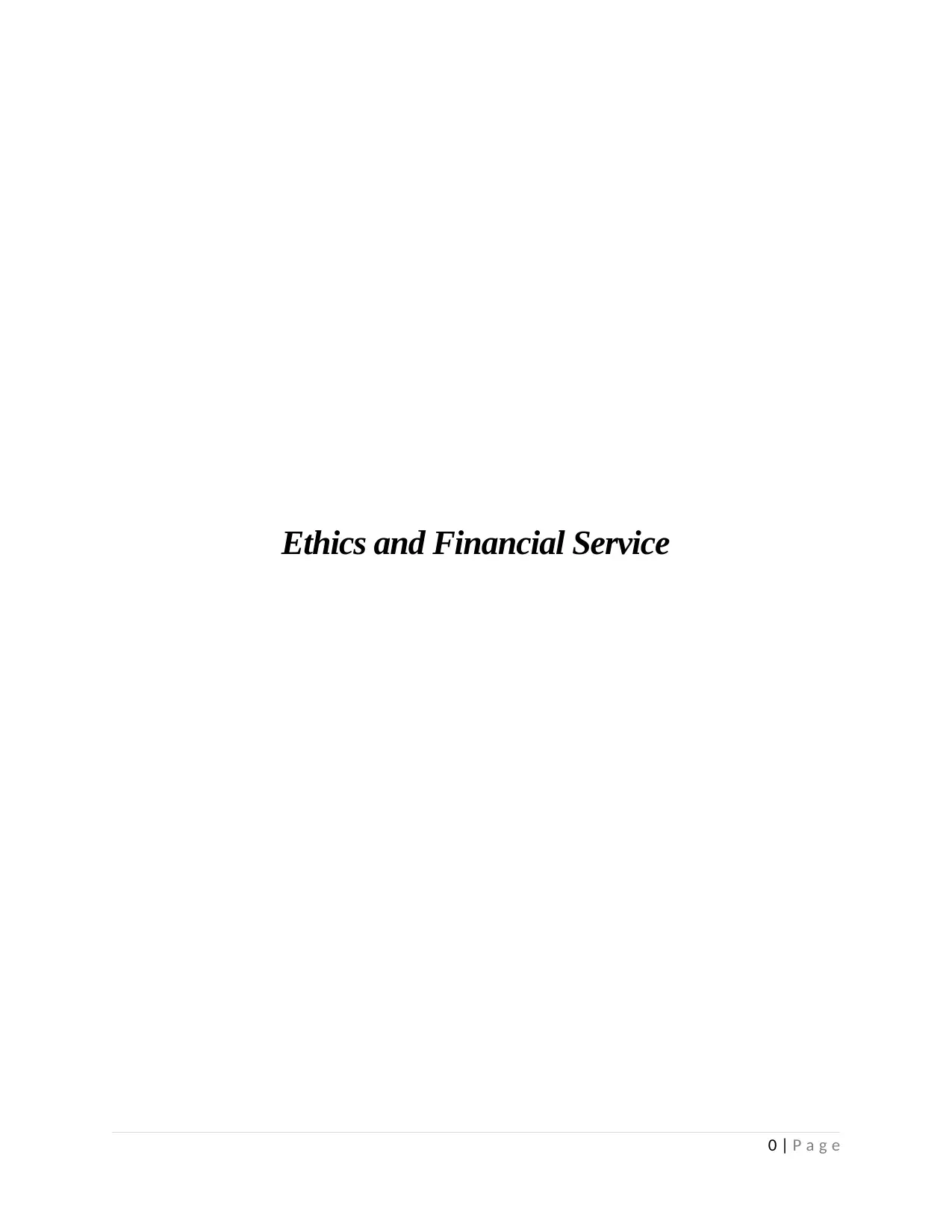
Ethics and Financial Service
0 | P a g e
0 | P a g e
Secure Best Marks with AI Grader
Need help grading? Try our AI Grader for instant feedback on your assignments.
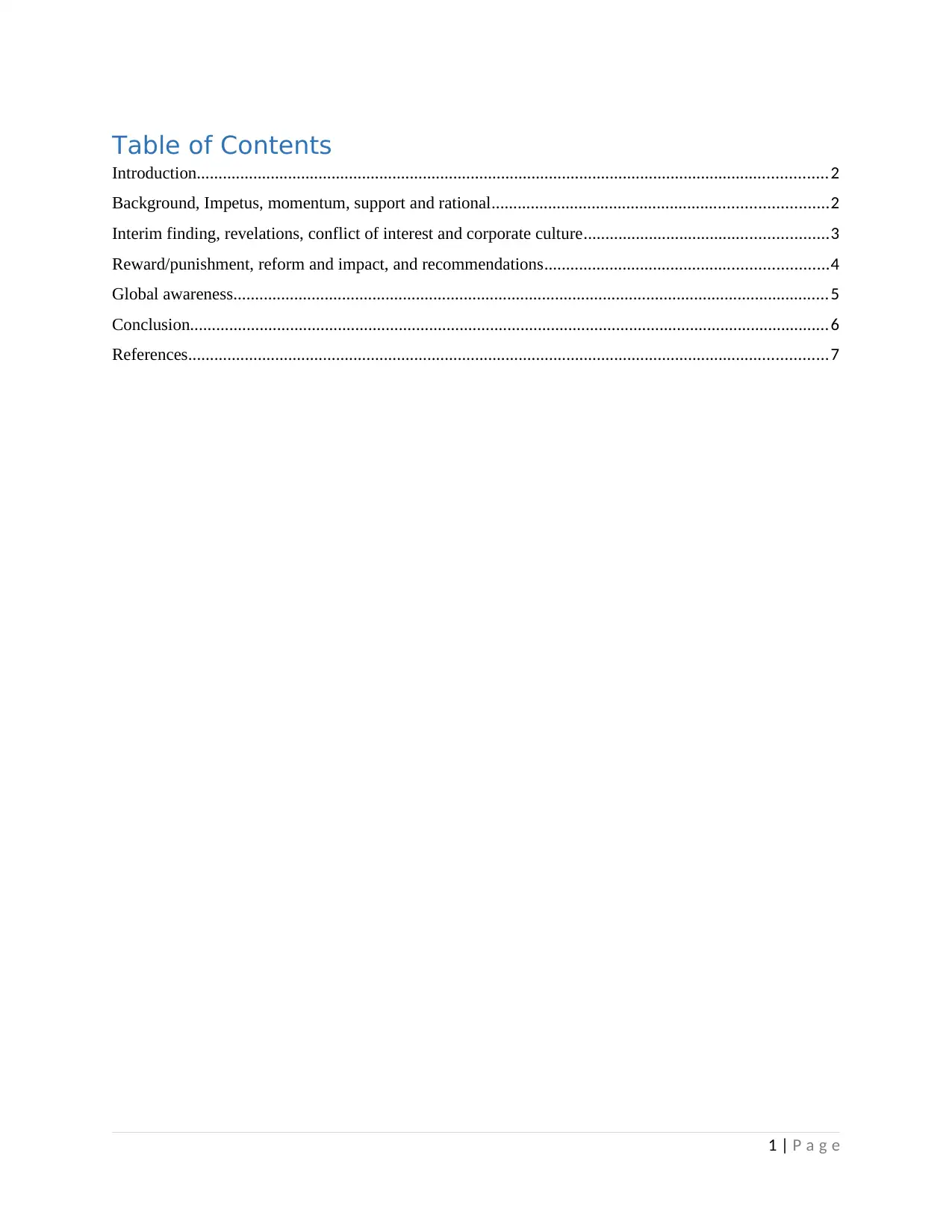
Table of Contents
Introduction.................................................................................................................................................2
Background, Impetus, momentum, support and rational.............................................................................2
Interim finding, revelations, conflict of interest and corporate culture........................................................3
Reward/punishment, reform and impact, and recommendations.................................................................4
Global awareness.........................................................................................................................................5
Conclusion...................................................................................................................................................6
References...................................................................................................................................................7
1 | P a g e
Introduction.................................................................................................................................................2
Background, Impetus, momentum, support and rational.............................................................................2
Interim finding, revelations, conflict of interest and corporate culture........................................................3
Reward/punishment, reform and impact, and recommendations.................................................................4
Global awareness.........................................................................................................................................5
Conclusion...................................................................................................................................................6
References...................................................................................................................................................7
1 | P a g e
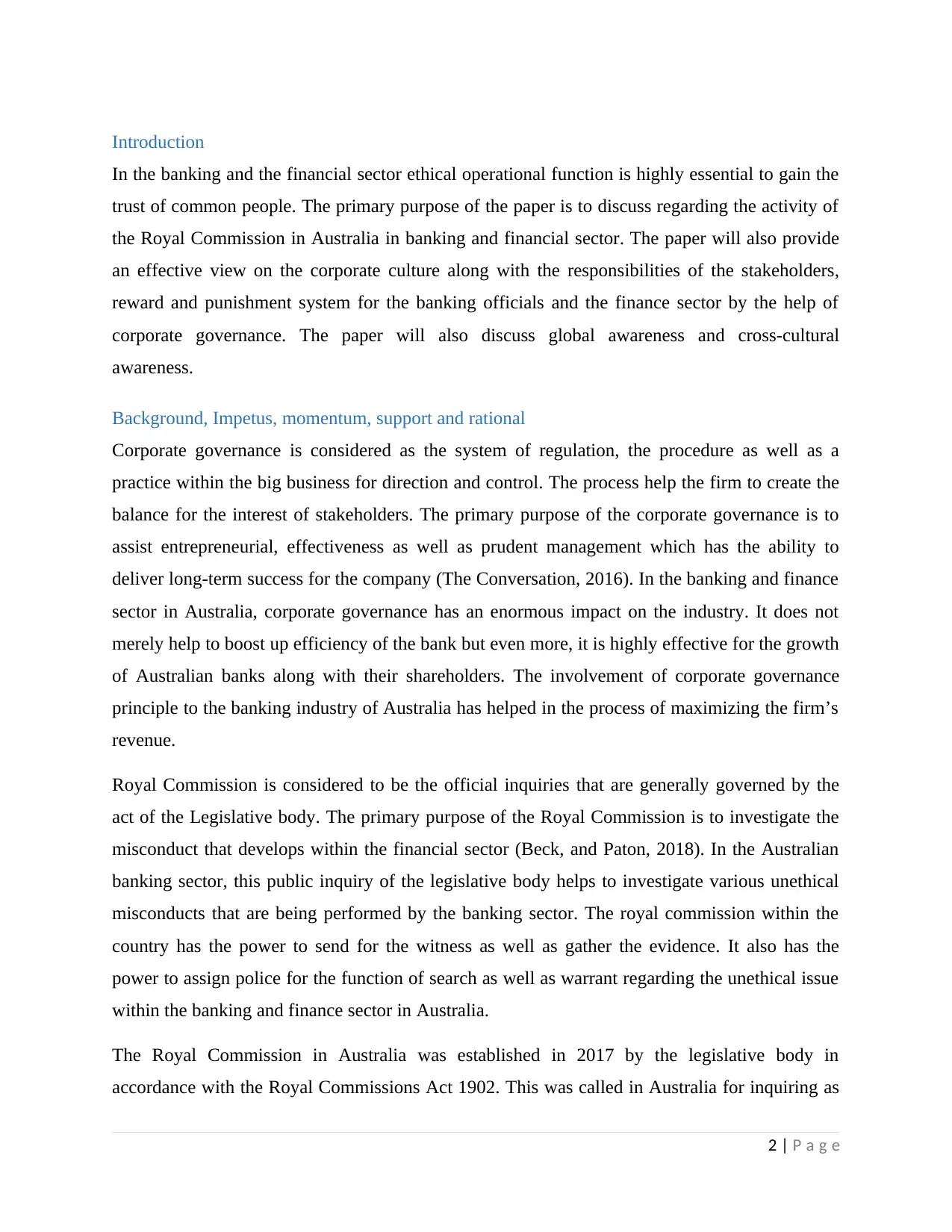
Introduction
In the banking and the financial sector ethical operational function is highly essential to gain the
trust of common people. The primary purpose of the paper is to discuss regarding the activity of
the Royal Commission in Australia in banking and financial sector. The paper will also provide
an effective view on the corporate culture along with the responsibilities of the stakeholders,
reward and punishment system for the banking officials and the finance sector by the help of
corporate governance. The paper will also discuss global awareness and cross-cultural
awareness.
Background, Impetus, momentum, support and rational
Corporate governance is considered as the system of regulation, the procedure as well as a
practice within the big business for direction and control. The process help the firm to create the
balance for the interest of stakeholders. The primary purpose of the corporate governance is to
assist entrepreneurial, effectiveness as well as prudent management which has the ability to
deliver long-term success for the company (The Conversation, 2016). In the banking and finance
sector in Australia, corporate governance has an enormous impact on the industry. It does not
merely help to boost up efficiency of the bank but even more, it is highly effective for the growth
of Australian banks along with their shareholders. The involvement of corporate governance
principle to the banking industry of Australia has helped in the process of maximizing the firm’s
revenue.
Royal Commission is considered to be the official inquiries that are generally governed by the
act of the Legislative body. The primary purpose of the Royal Commission is to investigate the
misconduct that develops within the financial sector (Beck, and Paton, 2018). In the Australian
banking sector, this public inquiry of the legislative body helps to investigate various unethical
misconducts that are being performed by the banking sector. The royal commission within the
country has the power to send for the witness as well as gather the evidence. It also has the
power to assign police for the function of search as well as warrant regarding the unethical issue
within the banking and finance sector in Australia.
The Royal Commission in Australia was established in 2017 by the legislative body in
accordance with the Royal Commissions Act 1902. This was called in Australia for inquiring as
2 | P a g e
In the banking and the financial sector ethical operational function is highly essential to gain the
trust of common people. The primary purpose of the paper is to discuss regarding the activity of
the Royal Commission in Australia in banking and financial sector. The paper will also provide
an effective view on the corporate culture along with the responsibilities of the stakeholders,
reward and punishment system for the banking officials and the finance sector by the help of
corporate governance. The paper will also discuss global awareness and cross-cultural
awareness.
Background, Impetus, momentum, support and rational
Corporate governance is considered as the system of regulation, the procedure as well as a
practice within the big business for direction and control. The process help the firm to create the
balance for the interest of stakeholders. The primary purpose of the corporate governance is to
assist entrepreneurial, effectiveness as well as prudent management which has the ability to
deliver long-term success for the company (The Conversation, 2016). In the banking and finance
sector in Australia, corporate governance has an enormous impact on the industry. It does not
merely help to boost up efficiency of the bank but even more, it is highly effective for the growth
of Australian banks along with their shareholders. The involvement of corporate governance
principle to the banking industry of Australia has helped in the process of maximizing the firm’s
revenue.
Royal Commission is considered to be the official inquiries that are generally governed by the
act of the Legislative body. The primary purpose of the Royal Commission is to investigate the
misconduct that develops within the financial sector (Beck, and Paton, 2018). In the Australian
banking sector, this public inquiry of the legislative body helps to investigate various unethical
misconducts that are being performed by the banking sector. The royal commission within the
country has the power to send for the witness as well as gather the evidence. It also has the
power to assign police for the function of search as well as warrant regarding the unethical issue
within the banking and finance sector in Australia.
The Royal Commission in Australia was established in 2017 by the legislative body in
accordance with the Royal Commissions Act 1902. This was called in Australia for inquiring as
2 | P a g e
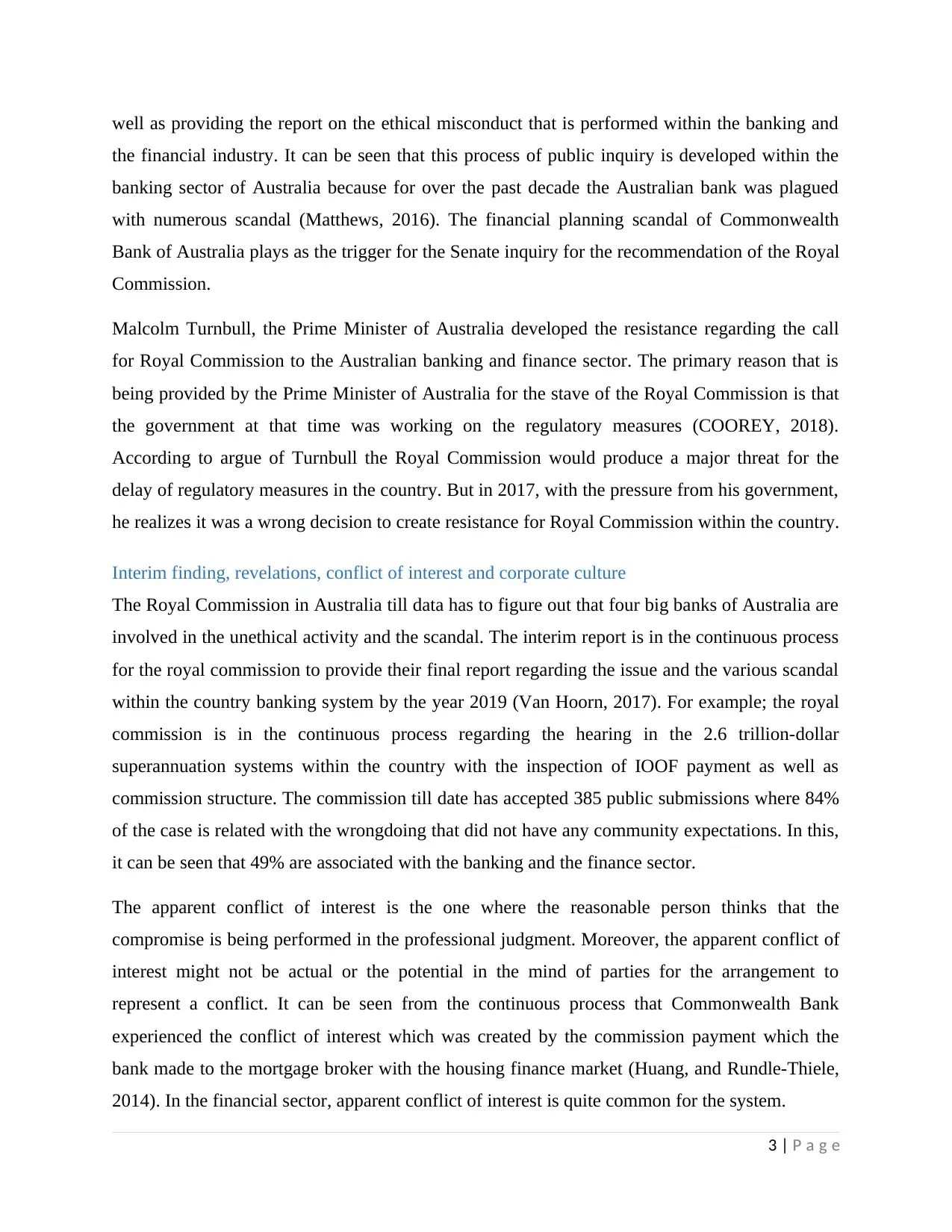
well as providing the report on the ethical misconduct that is performed within the banking and
the financial industry. It can be seen that this process of public inquiry is developed within the
banking sector of Australia because for over the past decade the Australian bank was plagued
with numerous scandal (Matthews, 2016). The financial planning scandal of Commonwealth
Bank of Australia plays as the trigger for the Senate inquiry for the recommendation of the Royal
Commission.
Malcolm Turnbull, the Prime Minister of Australia developed the resistance regarding the call
for Royal Commission to the Australian banking and finance sector. The primary reason that is
being provided by the Prime Minister of Australia for the stave of the Royal Commission is that
the government at that time was working on the regulatory measures (COOREY, 2018).
According to argue of Turnbull the Royal Commission would produce a major threat for the
delay of regulatory measures in the country. But in 2017, with the pressure from his government,
he realizes it was a wrong decision to create resistance for Royal Commission within the country.
Interim finding, revelations, conflict of interest and corporate culture
The Royal Commission in Australia till data has to figure out that four big banks of Australia are
involved in the unethical activity and the scandal. The interim report is in the continuous process
for the royal commission to provide their final report regarding the issue and the various scandal
within the country banking system by the year 2019 (Van Hoorn, 2017). For example; the royal
commission is in the continuous process regarding the hearing in the 2.6 trillion-dollar
superannuation systems within the country with the inspection of IOOF payment as well as
commission structure. The commission till date has accepted 385 public submissions where 84%
of the case is related with the wrongdoing that did not have any community expectations. In this,
it can be seen that 49% are associated with the banking and the finance sector.
The apparent conflict of interest is the one where the reasonable person thinks that the
compromise is being performed in the professional judgment. Moreover, the apparent conflict of
interest might not be actual or the potential in the mind of parties for the arrangement to
represent a conflict. It can be seen from the continuous process that Commonwealth Bank
experienced the conflict of interest which was created by the commission payment which the
bank made to the mortgage broker with the housing finance market (Huang, and Rundle-Thiele,
2014). In the financial sector, apparent conflict of interest is quite common for the system.
3 | P a g e
the financial industry. It can be seen that this process of public inquiry is developed within the
banking sector of Australia because for over the past decade the Australian bank was plagued
with numerous scandal (Matthews, 2016). The financial planning scandal of Commonwealth
Bank of Australia plays as the trigger for the Senate inquiry for the recommendation of the Royal
Commission.
Malcolm Turnbull, the Prime Minister of Australia developed the resistance regarding the call
for Royal Commission to the Australian banking and finance sector. The primary reason that is
being provided by the Prime Minister of Australia for the stave of the Royal Commission is that
the government at that time was working on the regulatory measures (COOREY, 2018).
According to argue of Turnbull the Royal Commission would produce a major threat for the
delay of regulatory measures in the country. But in 2017, with the pressure from his government,
he realizes it was a wrong decision to create resistance for Royal Commission within the country.
Interim finding, revelations, conflict of interest and corporate culture
The Royal Commission in Australia till data has to figure out that four big banks of Australia are
involved in the unethical activity and the scandal. The interim report is in the continuous process
for the royal commission to provide their final report regarding the issue and the various scandal
within the country banking system by the year 2019 (Van Hoorn, 2017). For example; the royal
commission is in the continuous process regarding the hearing in the 2.6 trillion-dollar
superannuation systems within the country with the inspection of IOOF payment as well as
commission structure. The commission till date has accepted 385 public submissions where 84%
of the case is related with the wrongdoing that did not have any community expectations. In this,
it can be seen that 49% are associated with the banking and the finance sector.
The apparent conflict of interest is the one where the reasonable person thinks that the
compromise is being performed in the professional judgment. Moreover, the apparent conflict of
interest might not be actual or the potential in the mind of parties for the arrangement to
represent a conflict. It can be seen from the continuous process that Commonwealth Bank
experienced the conflict of interest which was created by the commission payment which the
bank made to the mortgage broker with the housing finance market (Huang, and Rundle-Thiele,
2014). In the financial sector, apparent conflict of interest is quite common for the system.
3 | P a g e
Secure Best Marks with AI Grader
Need help grading? Try our AI Grader for instant feedback on your assignments.
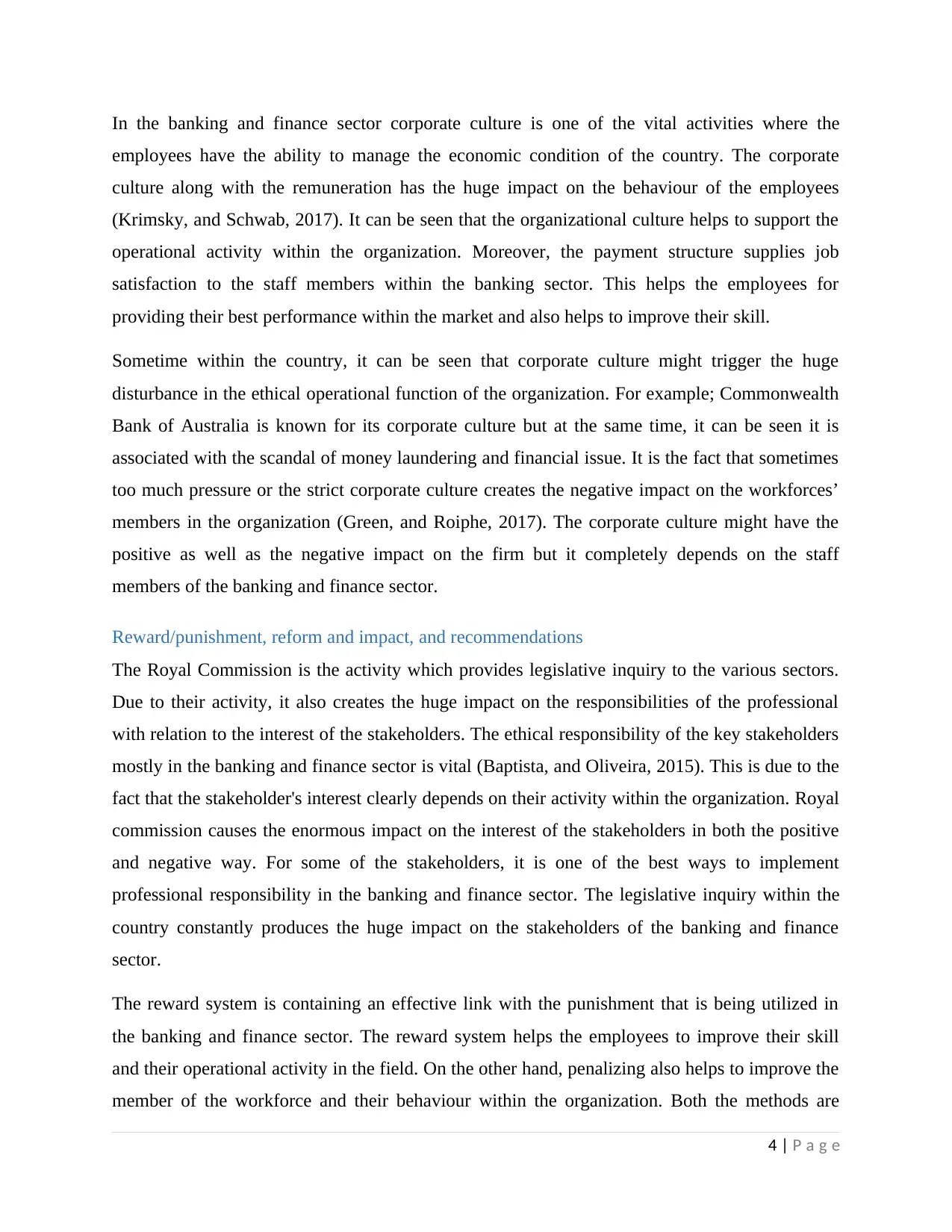
In the banking and finance sector corporate culture is one of the vital activities where the
employees have the ability to manage the economic condition of the country. The corporate
culture along with the remuneration has the huge impact on the behaviour of the employees
(Krimsky, and Schwab, 2017). It can be seen that the organizational culture helps to support the
operational activity within the organization. Moreover, the payment structure supplies job
satisfaction to the staff members within the banking sector. This helps the employees for
providing their best performance within the market and also helps to improve their skill.
Sometime within the country, it can be seen that corporate culture might trigger the huge
disturbance in the ethical operational function of the organization. For example; Commonwealth
Bank of Australia is known for its corporate culture but at the same time, it can be seen it is
associated with the scandal of money laundering and financial issue. It is the fact that sometimes
too much pressure or the strict corporate culture creates the negative impact on the workforces’
members in the organization (Green, and Roiphe, 2017). The corporate culture might have the
positive as well as the negative impact on the firm but it completely depends on the staff
members of the banking and finance sector.
Reward/punishment, reform and impact, and recommendations
The Royal Commission is the activity which provides legislative inquiry to the various sectors.
Due to their activity, it also creates the huge impact on the responsibilities of the professional
with relation to the interest of the stakeholders. The ethical responsibility of the key stakeholders
mostly in the banking and finance sector is vital (Baptista, and Oliveira, 2015). This is due to the
fact that the stakeholder's interest clearly depends on their activity within the organization. Royal
commission causes the enormous impact on the interest of the stakeholders in both the positive
and negative way. For some of the stakeholders, it is one of the best ways to implement
professional responsibility in the banking and finance sector. The legislative inquiry within the
country constantly produces the huge impact on the stakeholders of the banking and finance
sector.
The reward system is containing an effective link with the punishment that is being utilized in
the banking and finance sector. The reward system helps the employees to improve their skill
and their operational activity in the field. On the other hand, penalizing also helps to improve the
member of the workforce and their behaviour within the organization. Both the methods are
4 | P a g e
employees have the ability to manage the economic condition of the country. The corporate
culture along with the remuneration has the huge impact on the behaviour of the employees
(Krimsky, and Schwab, 2017). It can be seen that the organizational culture helps to support the
operational activity within the organization. Moreover, the payment structure supplies job
satisfaction to the staff members within the banking sector. This helps the employees for
providing their best performance within the market and also helps to improve their skill.
Sometime within the country, it can be seen that corporate culture might trigger the huge
disturbance in the ethical operational function of the organization. For example; Commonwealth
Bank of Australia is known for its corporate culture but at the same time, it can be seen it is
associated with the scandal of money laundering and financial issue. It is the fact that sometimes
too much pressure or the strict corporate culture creates the negative impact on the workforces’
members in the organization (Green, and Roiphe, 2017). The corporate culture might have the
positive as well as the negative impact on the firm but it completely depends on the staff
members of the banking and finance sector.
Reward/punishment, reform and impact, and recommendations
The Royal Commission is the activity which provides legislative inquiry to the various sectors.
Due to their activity, it also creates the huge impact on the responsibilities of the professional
with relation to the interest of the stakeholders. The ethical responsibility of the key stakeholders
mostly in the banking and finance sector is vital (Baptista, and Oliveira, 2015). This is due to the
fact that the stakeholder's interest clearly depends on their activity within the organization. Royal
commission causes the enormous impact on the interest of the stakeholders in both the positive
and negative way. For some of the stakeholders, it is one of the best ways to implement
professional responsibility in the banking and finance sector. The legislative inquiry within the
country constantly produces the huge impact on the stakeholders of the banking and finance
sector.
The reward system is containing an effective link with the punishment that is being utilized in
the banking and finance sector. The reward system helps the employees to improve their skill
and their operational activity in the field. On the other hand, penalizing also helps to improve the
member of the workforce and their behaviour within the organization. Both the methods are
4 | P a g e
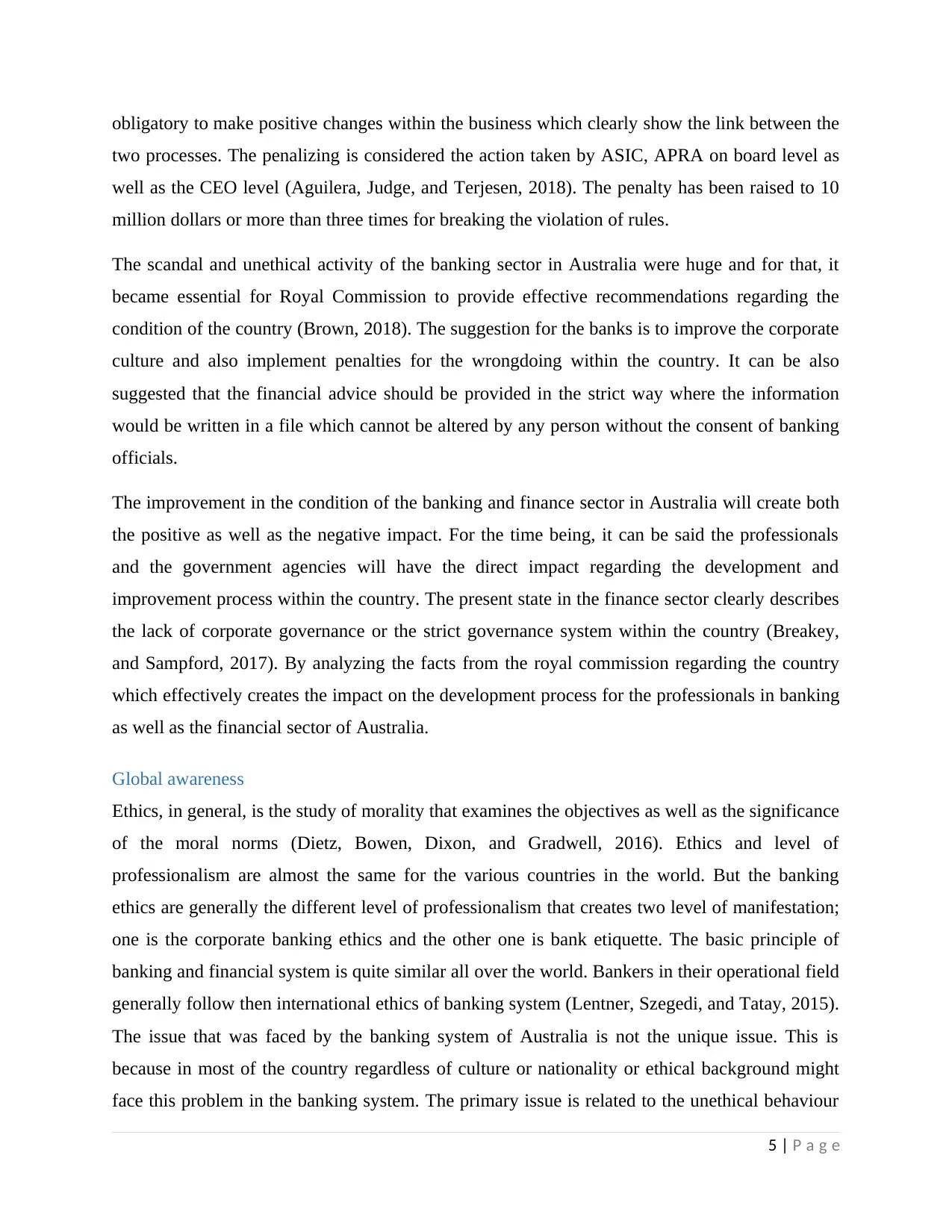
obligatory to make positive changes within the business which clearly show the link between the
two processes. The penalizing is considered the action taken by ASIC, APRA on board level as
well as the CEO level (Aguilera, Judge, and Terjesen, 2018). The penalty has been raised to 10
million dollars or more than three times for breaking the violation of rules.
The scandal and unethical activity of the banking sector in Australia were huge and for that, it
became essential for Royal Commission to provide effective recommendations regarding the
condition of the country (Brown, 2018). The suggestion for the banks is to improve the corporate
culture and also implement penalties for the wrongdoing within the country. It can be also
suggested that the financial advice should be provided in the strict way where the information
would be written in a file which cannot be altered by any person without the consent of banking
officials.
The improvement in the condition of the banking and finance sector in Australia will create both
the positive as well as the negative impact. For the time being, it can be said the professionals
and the government agencies will have the direct impact regarding the development and
improvement process within the country. The present state in the finance sector clearly describes
the lack of corporate governance or the strict governance system within the country (Breakey,
and Sampford, 2017). By analyzing the facts from the royal commission regarding the country
which effectively creates the impact on the development process for the professionals in banking
as well as the financial sector of Australia.
Global awareness
Ethics, in general, is the study of morality that examines the objectives as well as the significance
of the moral norms (Dietz, Bowen, Dixon, and Gradwell, 2016). Ethics and level of
professionalism are almost the same for the various countries in the world. But the banking
ethics are generally the different level of professionalism that creates two level of manifestation;
one is the corporate banking ethics and the other one is bank etiquette. The basic principle of
banking and financial system is quite similar all over the world. Bankers in their operational field
generally follow then international ethics of banking system (Lentner, Szegedi, and Tatay, 2015).
The issue that was faced by the banking system of Australia is not the unique issue. This is
because in most of the country regardless of culture or nationality or ethical background might
face this problem in the banking system. The primary issue is related to the unethical behaviour
5 | P a g e
two processes. The penalizing is considered the action taken by ASIC, APRA on board level as
well as the CEO level (Aguilera, Judge, and Terjesen, 2018). The penalty has been raised to 10
million dollars or more than three times for breaking the violation of rules.
The scandal and unethical activity of the banking sector in Australia were huge and for that, it
became essential for Royal Commission to provide effective recommendations regarding the
condition of the country (Brown, 2018). The suggestion for the banks is to improve the corporate
culture and also implement penalties for the wrongdoing within the country. It can be also
suggested that the financial advice should be provided in the strict way where the information
would be written in a file which cannot be altered by any person without the consent of banking
officials.
The improvement in the condition of the banking and finance sector in Australia will create both
the positive as well as the negative impact. For the time being, it can be said the professionals
and the government agencies will have the direct impact regarding the development and
improvement process within the country. The present state in the finance sector clearly describes
the lack of corporate governance or the strict governance system within the country (Breakey,
and Sampford, 2017). By analyzing the facts from the royal commission regarding the country
which effectively creates the impact on the development process for the professionals in banking
as well as the financial sector of Australia.
Global awareness
Ethics, in general, is the study of morality that examines the objectives as well as the significance
of the moral norms (Dietz, Bowen, Dixon, and Gradwell, 2016). Ethics and level of
professionalism are almost the same for the various countries in the world. But the banking
ethics are generally the different level of professionalism that creates two level of manifestation;
one is the corporate banking ethics and the other one is bank etiquette. The basic principle of
banking and financial system is quite similar all over the world. Bankers in their operational field
generally follow then international ethics of banking system (Lentner, Szegedi, and Tatay, 2015).
The issue that was faced by the banking system of Australia is not the unique issue. This is
because in most of the country regardless of culture or nationality or ethical background might
face this problem in the banking system. The primary issue is related to the unethical behaviour
5 | P a g e
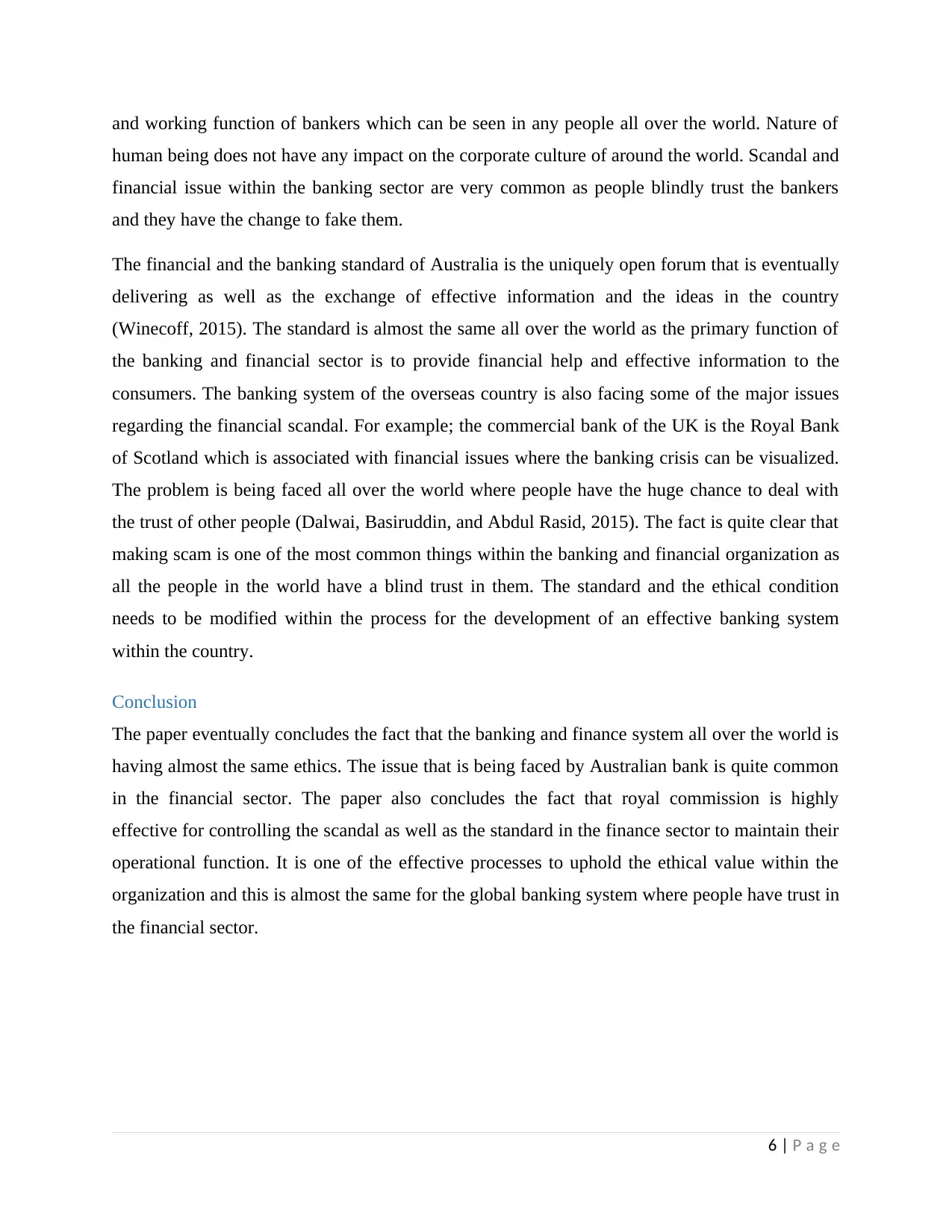
and working function of bankers which can be seen in any people all over the world. Nature of
human being does not have any impact on the corporate culture of around the world. Scandal and
financial issue within the banking sector are very common as people blindly trust the bankers
and they have the change to fake them.
The financial and the banking standard of Australia is the uniquely open forum that is eventually
delivering as well as the exchange of effective information and the ideas in the country
(Winecoff, 2015). The standard is almost the same all over the world as the primary function of
the banking and financial sector is to provide financial help and effective information to the
consumers. The banking system of the overseas country is also facing some of the major issues
regarding the financial scandal. For example; the commercial bank of the UK is the Royal Bank
of Scotland which is associated with financial issues where the banking crisis can be visualized.
The problem is being faced all over the world where people have the huge chance to deal with
the trust of other people (Dalwai, Basiruddin, and Abdul Rasid, 2015). The fact is quite clear that
making scam is one of the most common things within the banking and financial organization as
all the people in the world have a blind trust in them. The standard and the ethical condition
needs to be modified within the process for the development of an effective banking system
within the country.
Conclusion
The paper eventually concludes the fact that the banking and finance system all over the world is
having almost the same ethics. The issue that is being faced by Australian bank is quite common
in the financial sector. The paper also concludes the fact that royal commission is highly
effective for controlling the scandal as well as the standard in the finance sector to maintain their
operational function. It is one of the effective processes to uphold the ethical value within the
organization and this is almost the same for the global banking system where people have trust in
the financial sector.
6 | P a g e
human being does not have any impact on the corporate culture of around the world. Scandal and
financial issue within the banking sector are very common as people blindly trust the bankers
and they have the change to fake them.
The financial and the banking standard of Australia is the uniquely open forum that is eventually
delivering as well as the exchange of effective information and the ideas in the country
(Winecoff, 2015). The standard is almost the same all over the world as the primary function of
the banking and financial sector is to provide financial help and effective information to the
consumers. The banking system of the overseas country is also facing some of the major issues
regarding the financial scandal. For example; the commercial bank of the UK is the Royal Bank
of Scotland which is associated with financial issues where the banking crisis can be visualized.
The problem is being faced all over the world where people have the huge chance to deal with
the trust of other people (Dalwai, Basiruddin, and Abdul Rasid, 2015). The fact is quite clear that
making scam is one of the most common things within the banking and financial organization as
all the people in the world have a blind trust in them. The standard and the ethical condition
needs to be modified within the process for the development of an effective banking system
within the country.
Conclusion
The paper eventually concludes the fact that the banking and finance system all over the world is
having almost the same ethics. The issue that is being faced by Australian bank is quite common
in the financial sector. The paper also concludes the fact that royal commission is highly
effective for controlling the scandal as well as the standard in the finance sector to maintain their
operational function. It is one of the effective processes to uphold the ethical value within the
organization and this is almost the same for the global banking system where people have trust in
the financial sector.
6 | P a g e
Paraphrase This Document
Need a fresh take? Get an instant paraphrase of this document with our AI Paraphraser
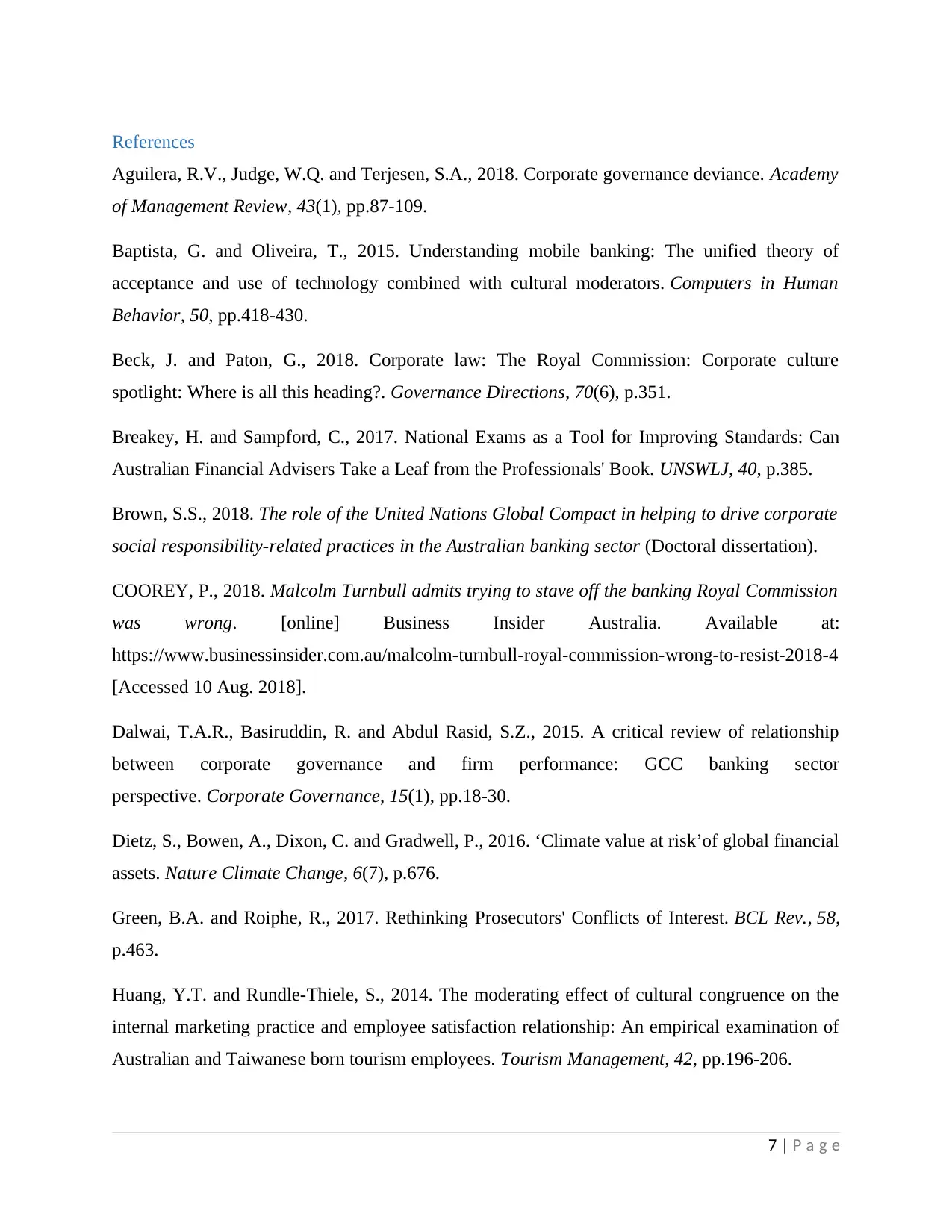
References
Aguilera, R.V., Judge, W.Q. and Terjesen, S.A., 2018. Corporate governance deviance. Academy
of Management Review, 43(1), pp.87-109.
Baptista, G. and Oliveira, T., 2015. Understanding mobile banking: The unified theory of
acceptance and use of technology combined with cultural moderators. Computers in Human
Behavior, 50, pp.418-430.
Beck, J. and Paton, G., 2018. Corporate law: The Royal Commission: Corporate culture
spotlight: Where is all this heading?. Governance Directions, 70(6), p.351.
Breakey, H. and Sampford, C., 2017. National Exams as a Tool for Improving Standards: Can
Australian Financial Advisers Take a Leaf from the Professionals' Book. UNSWLJ, 40, p.385.
Brown, S.S., 2018. The role of the United Nations Global Compact in helping to drive corporate
social responsibility-related practices in the Australian banking sector (Doctoral dissertation).
COOREY, P., 2018. Malcolm Turnbull admits trying to stave off the banking Royal Commission
was wrong. [online] Business Insider Australia. Available at:
https://www.businessinsider.com.au/malcolm-turnbull-royal-commission-wrong-to-resist-2018-4
[Accessed 10 Aug. 2018].
Dalwai, T.A.R., Basiruddin, R. and Abdul Rasid, S.Z., 2015. A critical review of relationship
between corporate governance and firm performance: GCC banking sector
perspective. Corporate Governance, 15(1), pp.18-30.
Dietz, S., Bowen, A., Dixon, C. and Gradwell, P., 2016. ‘Climate value at risk’of global financial
assets. Nature Climate Change, 6(7), p.676.
Green, B.A. and Roiphe, R., 2017. Rethinking Prosecutors' Conflicts of Interest. BCL Rev., 58,
p.463.
Huang, Y.T. and Rundle-Thiele, S., 2014. The moderating effect of cultural congruence on the
internal marketing practice and employee satisfaction relationship: An empirical examination of
Australian and Taiwanese born tourism employees. Tourism Management, 42, pp.196-206.
7 | P a g e
Aguilera, R.V., Judge, W.Q. and Terjesen, S.A., 2018. Corporate governance deviance. Academy
of Management Review, 43(1), pp.87-109.
Baptista, G. and Oliveira, T., 2015. Understanding mobile banking: The unified theory of
acceptance and use of technology combined with cultural moderators. Computers in Human
Behavior, 50, pp.418-430.
Beck, J. and Paton, G., 2018. Corporate law: The Royal Commission: Corporate culture
spotlight: Where is all this heading?. Governance Directions, 70(6), p.351.
Breakey, H. and Sampford, C., 2017. National Exams as a Tool for Improving Standards: Can
Australian Financial Advisers Take a Leaf from the Professionals' Book. UNSWLJ, 40, p.385.
Brown, S.S., 2018. The role of the United Nations Global Compact in helping to drive corporate
social responsibility-related practices in the Australian banking sector (Doctoral dissertation).
COOREY, P., 2018. Malcolm Turnbull admits trying to stave off the banking Royal Commission
was wrong. [online] Business Insider Australia. Available at:
https://www.businessinsider.com.au/malcolm-turnbull-royal-commission-wrong-to-resist-2018-4
[Accessed 10 Aug. 2018].
Dalwai, T.A.R., Basiruddin, R. and Abdul Rasid, S.Z., 2015. A critical review of relationship
between corporate governance and firm performance: GCC banking sector
perspective. Corporate Governance, 15(1), pp.18-30.
Dietz, S., Bowen, A., Dixon, C. and Gradwell, P., 2016. ‘Climate value at risk’of global financial
assets. Nature Climate Change, 6(7), p.676.
Green, B.A. and Roiphe, R., 2017. Rethinking Prosecutors' Conflicts of Interest. BCL Rev., 58,
p.463.
Huang, Y.T. and Rundle-Thiele, S., 2014. The moderating effect of cultural congruence on the
internal marketing practice and employee satisfaction relationship: An empirical examination of
Australian and Taiwanese born tourism employees. Tourism Management, 42, pp.196-206.
7 | P a g e
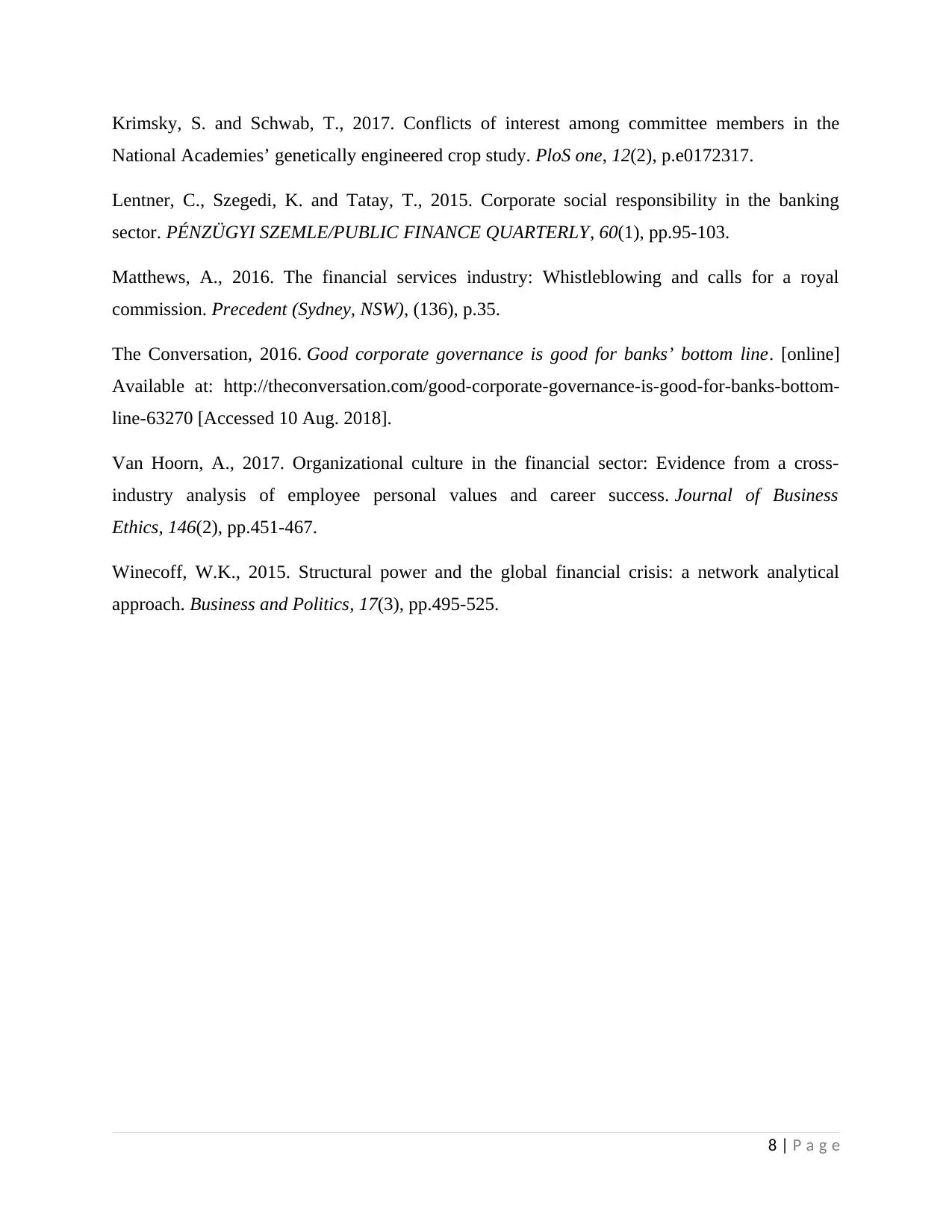
Krimsky, S. and Schwab, T., 2017. Conflicts of interest among committee members in the
National Academies’ genetically engineered crop study. PloS one, 12(2), p.e0172317.
Lentner, C., Szegedi, K. and Tatay, T., 2015. Corporate social responsibility in the banking
sector. PÉNZÜGYI SZEMLE/PUBLIC FINANCE QUARTERLY, 60(1), pp.95-103.
Matthews, A., 2016. The financial services industry: Whistleblowing and calls for a royal
commission. Precedent (Sydney, NSW), (136), p.35.
The Conversation, 2016. Good corporate governance is good for banks’ bottom line. [online]
Available at: http://theconversation.com/good-corporate-governance-is-good-for-banks-bottom-
line-63270 [Accessed 10 Aug. 2018].
Van Hoorn, A., 2017. Organizational culture in the financial sector: Evidence from a cross-
industry analysis of employee personal values and career success. Journal of Business
Ethics, 146(2), pp.451-467.
Winecoff, W.K., 2015. Structural power and the global financial crisis: a network analytical
approach. Business and Politics, 17(3), pp.495-525.
8 | P a g e
National Academies’ genetically engineered crop study. PloS one, 12(2), p.e0172317.
Lentner, C., Szegedi, K. and Tatay, T., 2015. Corporate social responsibility in the banking
sector. PÉNZÜGYI SZEMLE/PUBLIC FINANCE QUARTERLY, 60(1), pp.95-103.
Matthews, A., 2016. The financial services industry: Whistleblowing and calls for a royal
commission. Precedent (Sydney, NSW), (136), p.35.
The Conversation, 2016. Good corporate governance is good for banks’ bottom line. [online]
Available at: http://theconversation.com/good-corporate-governance-is-good-for-banks-bottom-
line-63270 [Accessed 10 Aug. 2018].
Van Hoorn, A., 2017. Organizational culture in the financial sector: Evidence from a cross-
industry analysis of employee personal values and career success. Journal of Business
Ethics, 146(2), pp.451-467.
Winecoff, W.K., 2015. Structural power and the global financial crisis: a network analytical
approach. Business and Politics, 17(3), pp.495-525.
8 | P a g e
1 out of 9
Related Documents
Your All-in-One AI-Powered Toolkit for Academic Success.
+13062052269
info@desklib.com
Available 24*7 on WhatsApp / Email
![[object Object]](/_next/static/media/star-bottom.7253800d.svg)
Unlock your academic potential
© 2024 | Zucol Services PVT LTD | All rights reserved.





